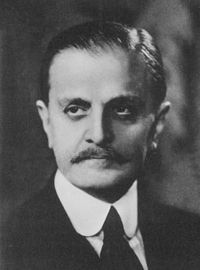Carlos Saavedra Lamas
| Carlos Saavedra Lamas | |
|---|---|
 |
|
| Born |
November 1, 1878 Buenos Aires, Argentina |
| Died | May 5, 1959 (aged 80) Buenos Aires, Argentina |
| Occupation | Politician, diplomat |
Carlos Saavedra Lamas (November 1, 1878 – May 5, 1959) was an Argentine academic and politician, and in 1936, the first Latin American Nobel Peace Prize recipient.
Born in Buenos Aires, Saavedra Lamas was a descendant of an early Argentine patriot. He married the daughter of president Roque Sáenz Peña. Saavedra Lamas achieved renown not only as foreign minister of Argentina for his practical work in drafting international agreements and in conducting international mediation, but also as a professor for his scholarship in the fields of labor legislation and international law.
Saavedra Lamas was a distinguished student at Lacordaire College and at the University of Buenos Aires where he received the Doctor of Laws degree in 1903, summa cum laude. After study in Paris and travel abroad, he accepted a professorship in law and constitutional history at the University of La Plata, where he began the teaching career that was to span more than forty years. Later, he inaugurated a course in sociology at the University of Buenos Aires, taught political economy and constitutional law in the Law School of the university, and eventually served as the president of the university.
Saavedra Lamas was a leading Argentine academician in two areas. A pioneer in the field of labor legislation, he edited several treatises on labor legislation in Argentina and on the need for a universally recognized doctrine on the treatment of labor - among them, Centro de legislacíon social y del trabajo (1927) [Center of Social and Labor Legislation], Traités internationaux de type social (1924), Código nacional del trabajo (three volumes, 1933) [National Code of Labor Law]. In the arena of practical affairs, Saavedra Lamas drafted legislation affecting labor in Argentina, supported the founding of the International Labor Organization in 1919, and presided over the ILO Conference of 1928 in Geneva while serving simultaneously as leader of the Argentine delegation.
In international law, his other field of major scholarly interest, he published "La Crise de la codification et de la doctrine Argentine de droit international" (1931); and he spoke, wrote, or drafted legislation on many subjects with international ramifications - among them, asylum, colonization, immigration, arbitration, and international peace. His brief Vida internacional, which he wrote at the age of seventy, is an urbane by-product of all this study and experience.
...
Wikipedia
